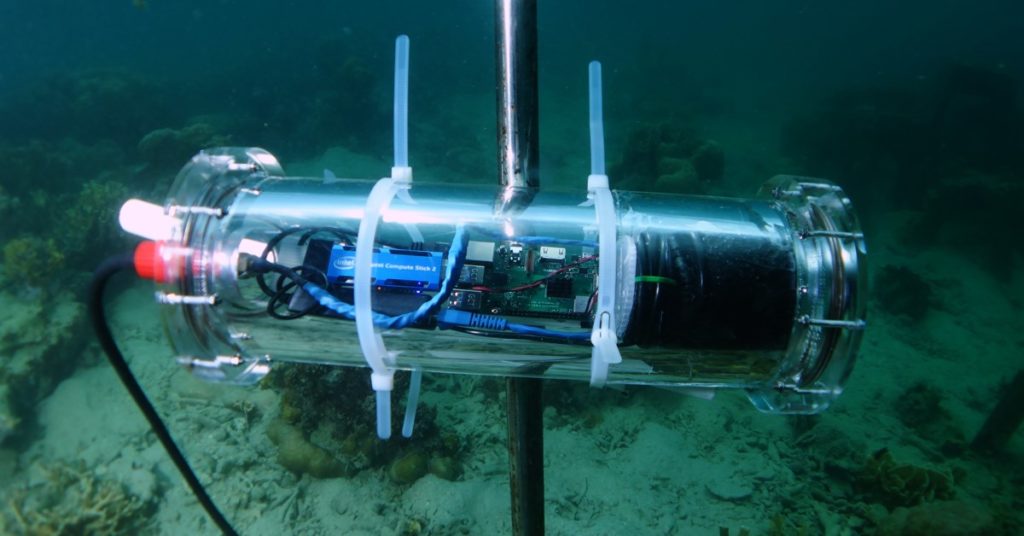Tech firms, PH environmental foundation develop AI solution to save coral reefs

An intelligent underwater video camera to detect, photograph and classify fish that helps Accenture, Intel and Sulubaaï Environmental Foundation make data-driven decisions for restoring the coral reef surrounding the Pangatalan Island in the Philippines. | Contributed photo
CEBU CITY, Philippines—Technology firms Accenture and Intel partnered with Philippine-based Sulubaaï Environmental Foundation to implement a project using artificial intelligence (AI) to monitor and restore a coral reef at an island northeast of Palawan.
The Project: CORail, an initiative of the three organizations created in 2019, developed an AI-powered solution and deployed it in a reef off Pangatalan Island since last year, according to an emailed press release from Accenture.
“Project: CORaiL is an incredible example of how AI and edge computing can be used to help researchers monitor and restore the coral reef. We are very proud to partner with Accenture and the Sulubaaï Environmental Foundation on this important effort to protect our planet,” said Rose Schooler, corporate vice president in Intel’s sales and marketing group.
Traditional coral reef monitoring efforts involve human divers manually capturing video footage and photos of the reef. In addition to being dangerous and time-intensive, this approach can disrupt marine life, as divers might inadvertently frighten fish into hiding
Through technology, the Project: CORaiL aims to identify the number and variety of fish around a reef, which serve as an important indicator of overall reef health.
First, the engineers from Accenture, Intel and Sulubaaï implemented an artificial, concrete reef — called a Sulu-Reef Prosthesis (SRP) — to provide support for unstable coral fragments underwater.
Designed by Sulubaaï, the SRP was placed in the reef surrounding the Pangatalan Island in the Philippines. Fragments of living coral were planted on it and will grow and expand, providing a hybrid habitat for fish and marine life.
The engineers then strategically placed intelligent underwater video cameras, equipped with the Accenture Applied Intelligence Video Analytics Services Platform (VASP), to detect and photograph fish as they pass by.
The VASP uses AI, powered by Intel Xeon, Intel FPGA Programmable Acceleration Cards and Intel Movidius VPU, to count and classify the marine life.
‘Hands on’ monitoring
The data is then sent to a surface dashboard, providing analytics and trends to researchers on the ground in real-time, enabling them to make data-driven decisions that will help the reef progress.
“The value of your data depends on how quickly you can glean insights to make decisions from it,” said Athina Kanioura, Accenture’s chief analytics officer and Accenture Applied Intelligence lead. “With the ability to do real-time analysis on streaming video, VASP enables us to tap into a rich data source — in effect doing ‘hands on’ monitoring without disrupting the underwater environment.”
Since being deployed in May 2019, the solution has collected roughly 40,000 images, which researchers have used to gauge reef health in real-time.
“Artificial intelligence provides unprecedented opportunities to solve some of society’s most vexing problems,” said Jason Mitchell, a managing director in Accenture’s Communications, Media & Technology practice and the company’s client lead for Intel. “Our ecosystem of corporate and social partners for this ‘AI for social good’ project proves that strength in numbers can make a positive environmental impact.”
Engineers from Accenture and Intel are now working on the next-gen Project: CORaiL prototype, which will include an optimized convolutional neural network and a backup power supply.
They are also looking into infra-red cameras, which will enable videos at night, to create a complete picture of the coral ecosystem. Additional uses could include studying the migration rate of tropical fish to colder countries and monitoring intrusion in protected or restricted underwater areas.
Coral reefs are some of the world’s most diverse ecosystems, with more than eight hundred species of corals building and providing habitats and shelter for approximately 25 percent of global marine life.
The reefs also benefit humans — protecting coastlines from tropical storms, providing food and income for 1 billion people, and generating US$9.6 billion in tourism and recreation annually. But reefs are being endangered and rapidly degraded by overfishing, bottom trawling, warming temperatures and unsustainable coastal development. /bmjo
Disclaimer: The comments uploaded on this site do not necessarily represent or reflect the views of management and owner of Cebudailynews. We reserve the right to exclude comments that we deem to be inconsistent with our editorial standards.
